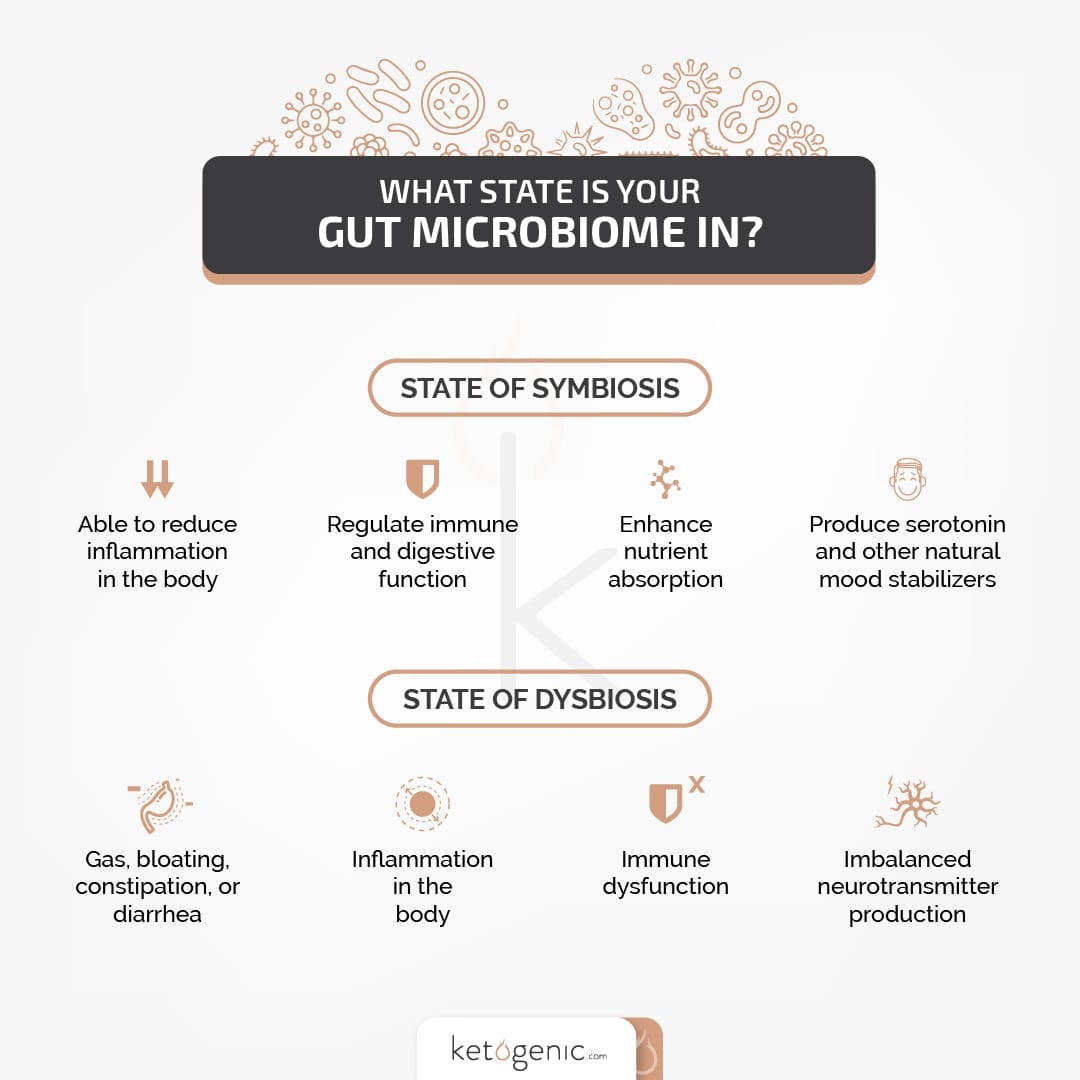How Can You Improve Your Gut Microbiome Health?

The gut microbiome is a wondrous place that has science in awe over the past few decades. A scientific revelation, the discovery of the microbiome has advanced health care and the medical community. So, what exactly is the gut microbiome? How can you improve the health of your gut microbiome?
What is the Microbiome?
The human microbiome collectively refers to the trillions of bacteria, fungi, and viruses present in the body. Some bacteria are pathogenic and associated with the disease, but others are beneficial for the immune system, heart, weight, and other aspects of health.
Viruses, fungi, bacteria, and other microscopic living organisms are called microorganisms or microbes. You have trillions of these microbes, with large amounts on your skin and inside your intestines.
The gut microbiome refers to the microbes in your intestines or your gut, or, more specifically, the microbes found in the pocket of the large intestine called the cecum. Of all the microbes in your body, bacteria are the most widely studied. You might be surprised to discover that you have more bacterial cells in your body than human cells [1] [2] [3] [4] [5].
The human gut microbiome has up to 1,000 species of bacteria, with each one playing a different role in the body. Most are important for your health, and others can cause or exacerbate the disease. Collectively, these microbes can weigh as much as 2-5 pounds! Many experts believe the microbes function together as an extra organ in the body that can be pivotal for health and wellness [6].
The gut microbiome affects your body from the second you’re born. For millions of years, humans have evolved with microbes, and without them, survival would be difficult. Over time, microbes learned to play important roles in the human body.
When you pass through your mother’s birth canal, you’re first exposed to beneficial microbes. Fascinating new research suggests that babies might also come into contact with some microbes inside the womb. Your gut microbiome diversifies and contains many different types of microbial species as you grow and develop. Higher microbiome diversity is associated with better general health [7] [8] [9] [10].
How Can You Improve the Health of Your Gut Microbiome?
You can improve your gut microbiome in many ways, such as:
- Consuming a diverse range of foods [11] [12]
- Consuming foods high in fiber and prebiotics, such as artichoke [13] [14] [15]/li>
- Eating fermented foods like sauerkraut and yogurt [16]
- Limiting artificial sweeteners like aspartame that might stimulate the growth of unhealthy bacteria [17]
- Eating foods rich in polyphenols — beneficial plant compounds found in green tea, olive oil, and other plant-based foods [18] [19]
- Taking a probiotic supplement to help reseed your gut with healthy microbes [20]
- Limiting your use of antibiotics that can kill off many of the good bacteria [21]
Certain microbes produce a lot of gas and other chemicals that might contribute to conditions like irritable bowel syndrome and symptoms like bloating, cramps, and abdominal pain. Gut dysbiosis refers to a microbial imbalance in the body — when one of the bacterial colonies is unbalanced [22].
Changing what you eat largely affects the bacteria in your digestive system. Research shows the ketogenic diet can positively affect your gut bacteria and might favor more beneficial types of gut bacteria. For example, the impressive impact the ketogenic diet has on conditions like epilepsy might be in part due to the changes in the microbiome [23]>. Going keto could positively impact your gut microbiome, gut health, and general wellness.
Some bacteria like Lactobacilli and Bifidobacteria are found in probiotics, yogurt, and fermented foods that have been shown to improve leaky gut syndrome or intestinal permeability. These species might reduce symptoms of irritable bowel syndrome (IBS) and help prevent disease-causing bacteria from sticking to the walls of your intestines.
How Do You Boost Your Gut Microbiome Health?
Have you noticed positive changes in your digestion and gut health since going keto? What steps do you take to boost the health of your gut microbiome?
References
Gerli, R., Bartoloni, E., & Alunno, A. (2016).Sjogren’s Syndrome: Novel insights in pathogenic, clinical, and therapeutic aspects. Elsevier.
Ursell, L. K., Metcalf, J. L., Parfrey, L. W., & Knight, R. (2012). Defining the human microbiome.Nutrition Reviews, 70(Suppl 1), S38-S44.
Center for Ecogenetics & Environmental Health. (2014). What is the Microbiome?
Amon, P., & Sanderson, I. (2017). What is the microbiome? BMJ, 102(5),
Sender, R., Fuchs, S., & Milo, R. (2016). Revised estimates for the number of human and bacteria cells in the body. PLoS Biology, 14(8), e1002533.
Integrative HMP (iHMP) Research Network Consortium. (2014). The integrative human microbiome project: Dynamic analysis of microbiome-host omics profiles during periods of human health and disease.Cell Host & Microbe, 16(3), 276-289.
Backhed, F., Roswall, J., Peng, Y., Feng, Q., Jia, H., Kovatcheva-Datchary, P., Li, Y., Xia, Y., Xie, H., Zhong, H., Khan, M. T., Zhang, J., Li, J., Xiao, L., Al-Aama, J., Zhang, D., Lee, Y. S., Kotowska, D., Colding, C., Tremaroli, V., Yin, Y., Bergman, S., Xu, X., Madsen, L., Kristiansen, K., Dahlgren, J., & Wang, J. (2015). Dynamics and stabilization of the human gut microbiome during the first year of life. Cell Host & Microbe, 17(5), 690-703.
Hill, C. J., Lynch, D. B., Murphy, K., Ulaszewska, M., Jeffery, I. B., O’Shea, C. A., Watkins, C., Dempsey, E., Mattivi, F., Tuohy, K., Ross, R. P., Ryan, C. A., O’Toole, P. W., & Stanton, C. (2017). Evolution of gut microbiota composition from birth to 24 weeks in the INFANTMET Cohort. 5(1), 4.
Aagaard, K., Ma, J., Antony, K. M., Ganu, R., Petrosino, J., & Versalovic, J. (2014). The placenta harbors a unique microbiome.Science Translational Medicine, 6(237), 237ra65.
Koenig, J., Spor, A., Scalfone, N., Fricker, A. D., Stombaugh, J., Knight, R., Angenent, L. T., & Ley, R. E. (2011). Succession of microbial consortia in the developing infant gut microbiome.Proceedings of the National Academy of Sciences in the United States of America, 108(Suppl 1), 4578-4585.
Heiman, M. L., & Greenway, F. L. (2016).A healthy gastrointestinal microbiome is dependent on dietary diversity. Molecular Metabolism, 5(5), 317-320.
David, L. A., Maurice, C. F., Carmody, R. N., Gootenberg, D. B., Button, J. E., Wolfe, B. E., Ling, A. V., Devlin, A. S., Varma, Y., Fischbach, M. A., Biddinger, S. B., Dutton, R. J., & Turnbaugh, P. J. (2014). Diet rapidly and reproducibly alters the human gut microbiome.Nature, 505(7484), 559-563.
Slavin, J. (2013). Fiber and prebiotics: Mechanisms and health benefits. Nutrients, 5(4), 1417-1435.
Sonnenburg, E. D., Smits, S. A., Tikhonov, M., Higginbottom, S. K., Wingreen, N. S., & Sonnenburg, J. L. (2016). Diet-induced extinctions in the gut microbiota compound over generations. Nature, 529(7585), 212-215.
Dewulf, E. M., Cani, P. D., Claus, S. P., Fuentes, S., Puylaert, P. G. B., Neyrinck, A. M., Bindels, L. B., De Vos, W. M., Gibson, G. R., Thissen, J-P., & Delzenne, N. M. (2013).Insight into the prebiotic concept: Lessons from an exploratory, double blind intervention study with inulin-type fructans in obese women. Gut, 62(8), 1112-1121.
Alvaro, E., Andrieux, C., Rochet, V., Rigottier-Gois, L., Lepercq, P., Sutren, M., Galan, P., Duval, Y., Juste, C., & Dore, J. (2007). Composition and metabolism of the intestinal microbiota in consumers and non-consumers of yogurt.British Journal of Nutrition, 97(1), 126-133.
Palmnas, M. S., Cowan, T. E., Bomhof, M. R., Su, J., Reimer, R. A., Vogel, H. J., Hittel, D. S., & Shearer, J. (2014). Low-dose aspartame consumption differentially affects gut microbiota-host metabolic interactions in the diet-induced obese rat.PLoS One, 9(10), e109841.
Cardona, F., Andres-Lacueva, C., Tulipani, S., Tinahones, F. J., & Queipo-Ortuno, M. I. (2013). Benefits of polyphenols on gut microbiota and implications in human health. Journal of Nutritional Biochemistry, 24(8), 1415-1422.
Tzounis, X., Rodriguez-Mateos, A., Vulevic, J., Gibson, G. R., Kwik-Uribe, C., & Spencer, J. P. E. (2011). Prebiotic evaluation of cocoa-derived flavanols in healthy humans by using a randomized, controlled, double-blind, crossover intervention study.American Journal of Clinical Nutrition, 93(1), 62-72.
McFarland, L. V. (2014). Use of probiotics to correct dysbiosis of normal microbiota following disease or disruptive events: A systematic review.BMJ Open, 4(8), e005047.
Bailey, L. C., Forrest, C. B., Zhang, P., Richards, T. M., Livshits, A., & DeRusso, P. A. (2014). Association of antibiotics in infancy with early childhood obesity.JAMA Pediatrics, 168(11), 1063-1069.
Pozuelo, M., Panda, S., Santiago, A., Mendez, S., Accarino, A., Santos, J., Guarner, F., Azpiroz, F., & Manichanch, C. (2015). Reduction of butyrate- and methane-producing microorganisms in patients with irritable bowel syndrome.Science Reports, 5, 12693.
Ulamek-Koziol, M., Czuczwar, S. J., Januszewski, S., & Pluta, R. (2019). Ketogenic diet and epilepsy. Nutrients, 11(10), 2510.
Bischoff, S. C., Barbara, G., Buurman, W., Ockhuizen, T., Schulzke, J-D., Serino, M., Tilg, H., Watson, A., & Wells, J. M. (2014). Intestinal permeability: A new target for disease prevention and therapy. BMC Gastroenterology, 14, 189.
Chenoll, E., Casinos, B., Bataller, E., Astals, P., Echevarria, J., Iglesias, J. R., Balbarie, P., Ramon, D., & Genoves, S. (2010). Novel probiotic Bifidobacterium bifidum CECT 7366 strain active against the pathogenic bacterium Helicobacter pylori. Applied and Environmental Microbiology, 77(4), 1335-1343.
McFarland, L. V., & Dublin, S. (2008). Meta-analysis of probiotics for the treatment of irritable bowel syndrome.World Journal of Gastroenterology, 14(17), 2650-2661.









